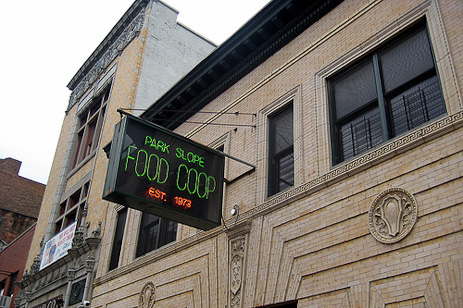 The Park Slope Food Co-OpPhoto: WallyGBrooklyn’s Park Slope Food Co-op has long struck me as a kind of city in miniature. Like a great metropolis, on some level it shouldn’t work. But it does — spectacularly.
The Park Slope Food Co-OpPhoto: WallyGBrooklyn’s Park Slope Food Co-op has long struck me as a kind of city in miniature. Like a great metropolis, on some level it shouldn’t work. But it does — spectacularly.
What do I mean by that? Let’s start with the miraculous functionality of large cities. Walk the chaotic streets of a metropolis — say, New York or Mexico City — and contemplate the task of providing millions with basic services like food, water, and transportation. Try pulling a random pedestrian aside and asking her how it all happens. How does Mexico City get water over the mountains that surround it — and available to 20 million people at the touch of a tap? What force keeps New York’s thousands of corner bodegas stocked with flawless fruit and flowers — and its subways running with remarkable efficiency, considering all the factors that could bollocks these things up?
No one person has all the answers — only some have any answers at all — yet cities function more or less smoothly, the sum of the disparate actions and decisions of countless individuals. I am in awe of the process.
The Park Slope Food Co-Op has many of the same attributes. It is a unique institution — a grocery store in which the shopper/members do the great bulk of the work. They stock the shelves, break down the boxes, cut giant blocks of cheese for the cheese section, work the checkout stands, keep the bathrooms clean during business hours, and more. I was a member when I lived in New York in the early 2000s. I loved its high-functioning city-like chaos. At any given time, the tightly packed store might have a hundred of people shopping and another dozen or two working their monthly 2-hour-and-45-minute shifts. If you had a question about some procedure or policy for a fellow shopper/member, by far the most common answer you got was “I don’t know.” At times, it seemed that no one knew anything. Yet Park Slope Food Co-op works; it is the best-stocked, best-run, and cheapest health-food/gourmet grocery I’ve ever seen. It is also by far the most ethnically diverse, with the polyglot grandeur of the surrounding city.
The video below (if you have trouble loading it, go here to watch it), from New York City news affiliate NY1, captures some of the co-op’s glory. According to NY1, it does $40 million per year in business. Nearly all of its expenditures go to organic products; meat, eggs, and dairy are mainly sourced locally. During the growing season, the produce section has the feel of a top-quality farmers market. There are nearby farms that sell all of their produce to the co-op.
Because almost all of the grunt work is conducted by members, the co-op generates a few high-skilled, decent-paid jobs instead of (like most grocery stors) many low-skill, low-wage ones. Low labor costs and the lack of the profit motive allow the co-op to have a simple pricing policy: everything gets a 20 percent mark-up, a level dramatically lower than that of chain natural-foods markets like Whole Foods. That adds up to prices so cheap that it becomes painful for longtime members to shop anywhere else. The monthly work shifts also put members into contact with people they’d never otherwise get to know. In a huge and often cold city, few things generate the potential for friendship and hilarity like working together on menial tasks.
In short, Park Slope Food Co-Op bundles its members’ food-buying power and uses it in a way that benefits the broader foodshed. I’m glad to hear from NY1 that it not only continues to thrive, but is being replicated throughout the city.



